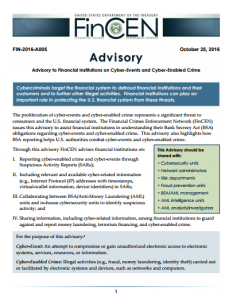- UK Government launches new National Cyber Security Strategy today (SC Magazine): The UK will announce a new national cyber strategy later today, according to reports. An article says that Chancellor Phillip Hammond will outline a £1.9 billion plan to become “the safest place in the world” to do business. This nearly doubles the previous strategy, the article says, and addresses vulnerabilities in connected devices and outdated systems, among other things. The strategy will reportedly have three components: defence, deter, and develop. The financial commitment and government efforts through the National Cyber Security Centre will be coupled with efforts to build partnerships in the private sector and academia, SC reports. The full text of the article can be found here.

- Treasury’s Financial Crimes Unit Releases Cyber Guidance (ABA Banking Journal): The Treasury Department’s Financial Crime Enforcement Network (FinCEN) released advisory guidelines for cyber security along with FAQ’s, a recent article reported. The report makes clear that nothing in the release alters any existing rules or reporting requirements. The release is meant to help businesses help navigate the Bank Secrecy Act, and suggests that even if reporting isn’t required in a specific incident, it can still greatly help in the efforts to fight cyber attacks. The full text of the article can be found here, and the guidelines are included in this post.
- Device Makers Face Legal Trouble over Internet of Things Attack (Fortune): Amongst the widespread media coverage over the massive DDoS attacks a few weeks ago, one report analyzes the potential legal repercussions. The article poses the million dollar (or more) question of who should be held responsible, and suggests that the answer seemingly may be the device makers. While some companies are small and unknown, there are also major brands like Panasonic, the report says. Simple requirements like a password change would have prevented the attacks, according to the article, and many of these devices are still in circulation. Questions remain as to who would bring the suits, either Dyn or individual consumers, but the litigation would not be a sure victory, the article suggests. The full text of the article can be found here.
Cybersecurity, Law, Official Policy




Leave a Reply